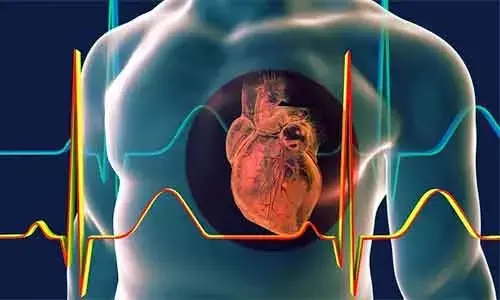- Home
- Medical news & Guidelines
- Anesthesiology
- Cardiology and CTVS
- Critical Care
- Dentistry
- Dermatology
- Diabetes and Endocrinology
- ENT
- Gastroenterology
- Medicine
- Nephrology
- Neurology
- Obstretics-Gynaecology
- Oncology
- Ophthalmology
- Orthopaedics
- Pediatrics-Neonatology
- Psychiatry
- Pulmonology
- Radiology
- Surgery
- Urology
- Laboratory Medicine
- Diet
- Nursing
- Paramedical
- Physiotherapy
- Health news
- Fact Check
- Bone Health Fact Check
- Brain Health Fact Check
- Cancer Related Fact Check
- Child Care Fact Check
- Dental and oral health fact check
- Diabetes and metabolic health fact check
- Diet and Nutrition Fact Check
- Eye and ENT Care Fact Check
- Fitness fact check
- Gut health fact check
- Heart health fact check
- Kidney health fact check
- Medical education fact check
- Men's health fact check
- Respiratory fact check
- Skin and hair care fact check
- Vaccine and Immunization fact check
- Women's health fact check
- AYUSH
- State News
- Andaman and Nicobar Islands
- Andhra Pradesh
- Arunachal Pradesh
- Assam
- Bihar
- Chandigarh
- Chattisgarh
- Dadra and Nagar Haveli
- Daman and Diu
- Delhi
- Goa
- Gujarat
- Haryana
- Himachal Pradesh
- Jammu & Kashmir
- Jharkhand
- Karnataka
- Kerala
- Ladakh
- Lakshadweep
- Madhya Pradesh
- Maharashtra
- Manipur
- Meghalaya
- Mizoram
- Nagaland
- Odisha
- Puducherry
- Punjab
- Rajasthan
- Sikkim
- Tamil Nadu
- Telangana
- Tripura
- Uttar Pradesh
- Uttrakhand
- West Bengal
- Medical Education
- Industry
Improper calorie intake may increase re-hospitalization in Heart Failure

Insufficient calorie intake reduced post-discharge quality of life which in turn increased the burden of re-hospitalization in patients with Heart Failure (HF). The recent study was published in the Journal of American college of Cardiology, 2020.
Researchers from the University of Michigan and Columbia University evaluated the relationship between calorie intake and post-discharge outcomes in hospitalized patients with heart failure (HF). These findings provide new insight into the importance of sufficient calorie intake and nutrition levels which can otherwise cause adverse outcomes in HF. Sodium restriction in diet may further worsen the nutritional intake inadvertently and thus affecting the quality of life. Insufficient calorie intake was defined as <90% of metabolic needs.
Also read: Same day discharge after AF ablation not tied to complications: Study
There were 57 participants in the study with a mean age of 70 ± 8 years. In a dietary intervention trial, baseline nutritional intake in HF inpatients was estimated using the Block Food Frequency Questionnaire (FFQ), and the Nutritional Risk Index (NRI) was calculated. Also a 15-point micro-nutrient deficiency score was created for insufficient calorie intake. Adjusted linear, logistic, and negative binomial regression were used to evaluate associations between insufficient calorie intake and quality of life (using the Kansas City Cardiomyopathy Questionnaire Clinical Summary [KCCQ-CS]), readmission risk, and days re-hospitalized over 12 weeks.
The key findings of the study are as follows:
- Out of the total participants, 31% were female with a mean body mass index 32 ± 8 kg/m2 .
- Median sodium and calorie intake amounts were 2,987mg/day and 1,602kcal/day, respectively.
- 11% of these patients were screened as malnourished by the NRI.
- All patients consuming <2,000 mg/day sodium had insufficient calorie intake; this group also more frequently had dietary micro-nutrient and protein deficiencies.
- At 12 weeks, patients with insufficient calorie intake had less improvement in the KCCQ-CS score, higher odds of readmission, and more days re-hospitalized.
The researchers thus concluded that, in-spite of a high prevalence for obesity and rare overt malnutrition, insufficient calorie intake was associated with poorer post-discharge quality of life and increased burden of readmission in patients with HF. Inpatient dietary assessment could improve readmission risk stratification and helps identify patients for nutritional intervention.
For further reading, click the following link: https://doi.org/10.1016/j.jchf.2020.04.004
BDS, MDS
Dr.Niharika Harsha B (BDS,MDS) completed her BDS from Govt Dental College, Hyderabad and MDS from Dr.NTR University of health sciences(Now Kaloji Rao University). She has 4 years of private dental practice and worked for 2 years as Consultant Oral Radiologist at a Dental Imaging Centre in Hyderabad. She worked as Research Assistant and scientific writer in the development of Oral Anti cancer screening device with her seniors. She has a deep intriguing wish in writing highly engaging, captivating and informative medical content for a wider audience. She can be contacted at editorial@medicaldialogues.in.
Dr Kamal Kant Kohli-MBBS, DTCD- a chest specialist with more than 30 years of practice and a flair for writing clinical articles, Dr Kamal Kant Kohli joined Medical Dialogues as a Chief Editor of Medical News. Besides writing articles, as an editor, he proofreads and verifies all the medical content published on Medical Dialogues including those coming from journals, studies,medical conferences,guidelines etc. Email: drkohli@medicaldialogues.in. Contact no. 011-43720751


